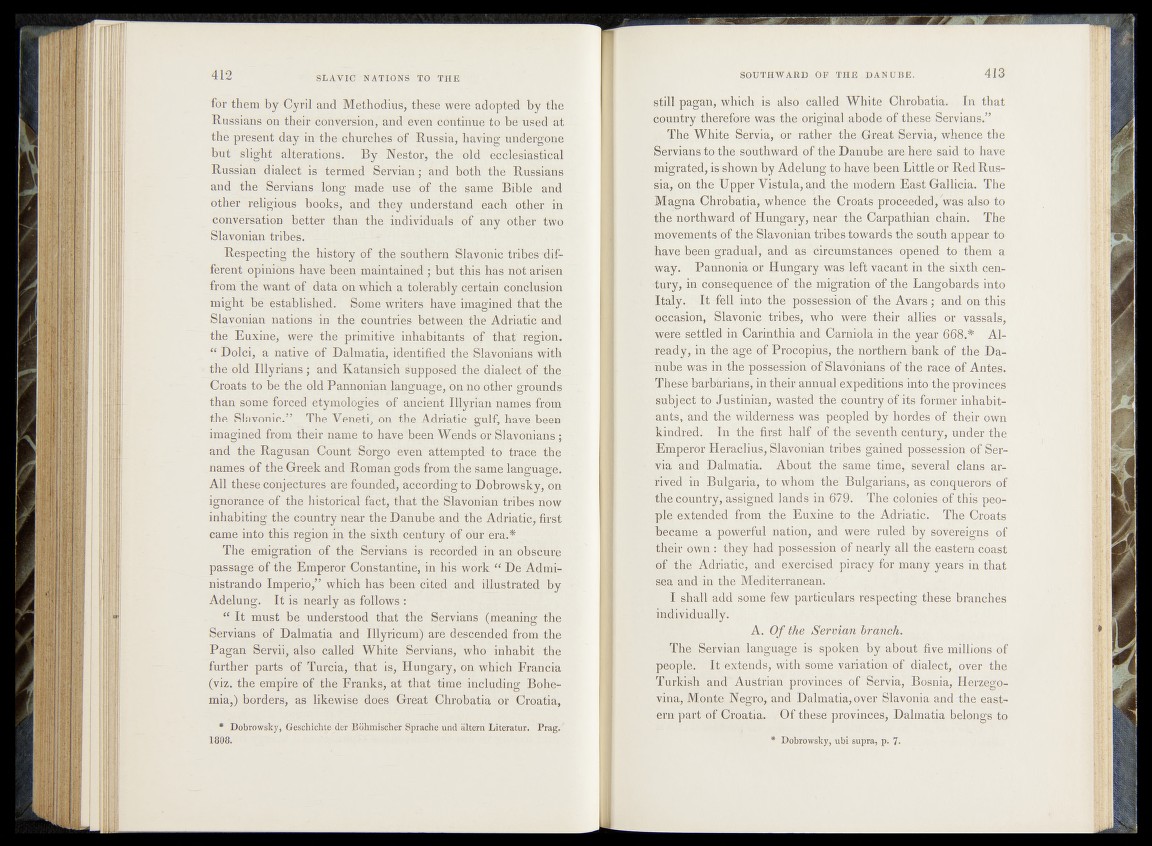
for them by Cyril and Methodius, these were adopted by the
Russians on their conversion, and even continue to be used at
the present day in the churches of Russia, having undergone
but slight alterations. By Nestor, the • old ecclesiastical
Russian dialect is termed Servian; and both the Russians
aud the Servians long made use of the same Bible and
other religious books, and they understand each other in
conversation better than the individuals of any other two
Slavonian tribes. -
Respecting the history of the southern Slavonic; tribes^dif-
ferent opinions have been maintained ; but this has not arisen
from the want of data on which a tolerably certain conclusion
might bë established. Some writers have imagined that the
Slavonian nations in the countries betweenjhe Adriatic and
the Euxine, were the primitive inhabitants of that 'Tegiön.
“ Dolci, a native of Dalmatia, identified the Slavonians with
the old Illyrians; and KatansiehSupposed the dialéct'of.the _
Croats to be the old Pannonianianguage, on no other grounds
than some forced etymologies of ancient Illyrian names from
the Slavonic.” The Venetr, On the Adriatic gulf; have been
imagined from their name to have^been Wends or Slavonians;
and the Ragusan Count Sorgo even attempted to trace the
names of the Greek and Roman gods from the same language.
All these conjectures are founded, according to Dobrowsky, on
ignorance of the historical fact, that’the Slavonian tribes how
inhabiting the country near the Dahubennd the Adriatic, first
came into this region jm the sixth century of ohr era.*
The emigration of the Servians is recorded in an obscure
passage of the Emperor Constantine, in his work “ De Admi-
nistrando Imperio,” which has been cited and illustrated by
Adelung. It is nearly as follows :
“ It must b e ,understood that the Servians (meaning the
Servians of Dalmatia and IÜyricum) are descended from the
Pagan Servii, also called White Servians, who inhabit the
further parts of Turcia, that is, Hungary) on which Francia
(viz. the empire of the Franks, at that time including Bohemia,)
borders, as likewise does Great Chrobatia or Croatia,
* Dobrowsky, Geschichte der Böhmischer Sprache und altern Literatur. P ra g /
1808.
still pagan, which is also called White Chrobatia. In that
country, therefore was the original abode of these Servians.”
The White Servia, .or rather the Great Servia, whence the
Servians to the. southward of ,the Danube are here said to have
migrated, isshown by Adelung to have been Little or Red Russia,
on the Upper Vistula, and the modem East Gallicia. The
M agna Chrobatia, whence the Croats proceeded, was also to
the northward of Hungary, near 'the Carpathian chain. The
movements of the Slavonian tribes towards the south appear to
have been gradual, and as cirbdmsfaMpes opened to them a.
way. Pannonia or Htirigary was left vacant in the sixth cem
*fcury, in consequence! of the migration of the Langobards into
Italy. It hllljipto'’ thfe‘possession of the Avars; and on this
Occasion, Slavonic tribes, ‘ who were their allies or vassals^
(were settled in Carinthia and QaïmplV in jtïm year Already,
in the rige of Procopius, the northermbank of the Da-
"niibe was iri/the pbssessipn1 of Slavonians of me race of Antes.
jT.nése barbarians,'in their annual expeditions into the provinces
subject to Justinian, wasted^! countrym*|ts former inhabitants,'
and the wildetn'eSS was peopled ^ ;h o ^ ^ -B f their bwn
/kindred. In -the first half of th ^ ëm n tf(,cêSi|ur^,‘ under the;
Emperor Heraclius,.Slavonian tribes gained possession of Ser-
via and Dalmatia. About the time, several clans arrived
in Bulgaria, to whom the Bulgarians., as conquerors of
the country, assigned lands in 679. The colonies of this peop
l e extended from the Euxine. to the Adriatich* The Croats
became a .powerful nation,- and were.,ruled p y sovegpjgns,- of
.their own : they had;possession öf nearly1 all thq,,e^sfefh coast
of the Adriatic, and exercised piracy for-mahy years in that
sea and-in the Mediterranean.
I shall add some few particulars respecting thes^brariches
individual]^;',
A. Of the Servian branch.
■ The- Servian language,, is spokpn. by. about five millions of
people. It%xtènds, with-'some variatibif of ^(ha£ect,s over the
Turkish and " Austrian province^ of Servia, Bosnia, Héiyëg^.
vine, Monte,, Megr%;and Dalmatia, over Slavama and thq eastern
part Of Croatia.- /O f these* provinces, Dalmatia belongs to
* Dobrowsky, ubi' supra, p. 7.